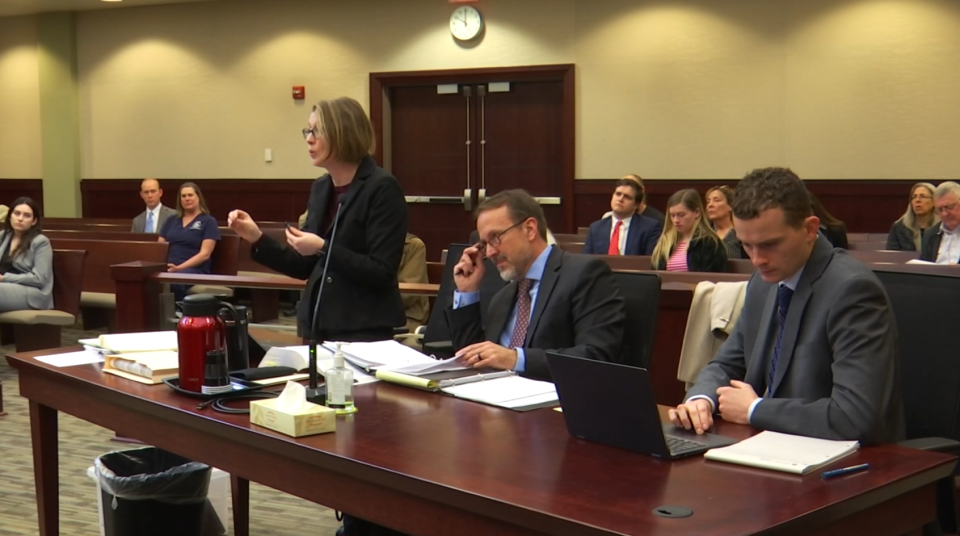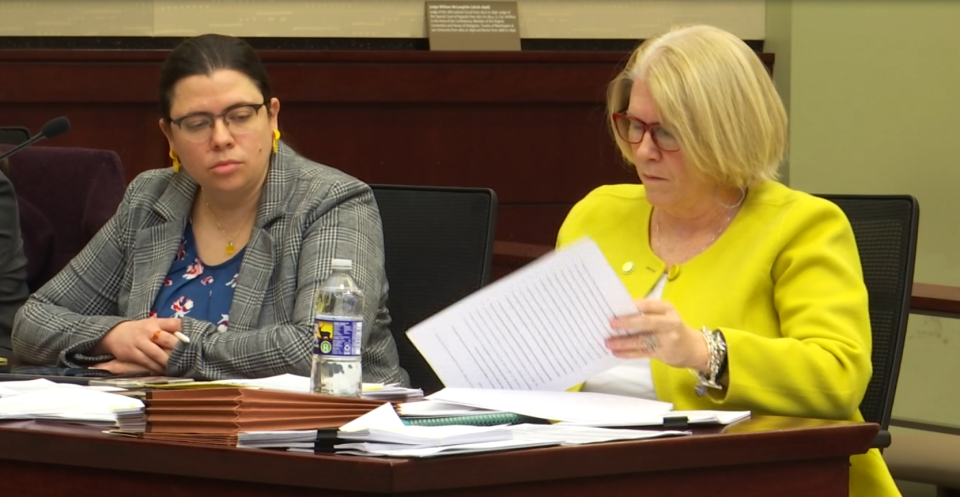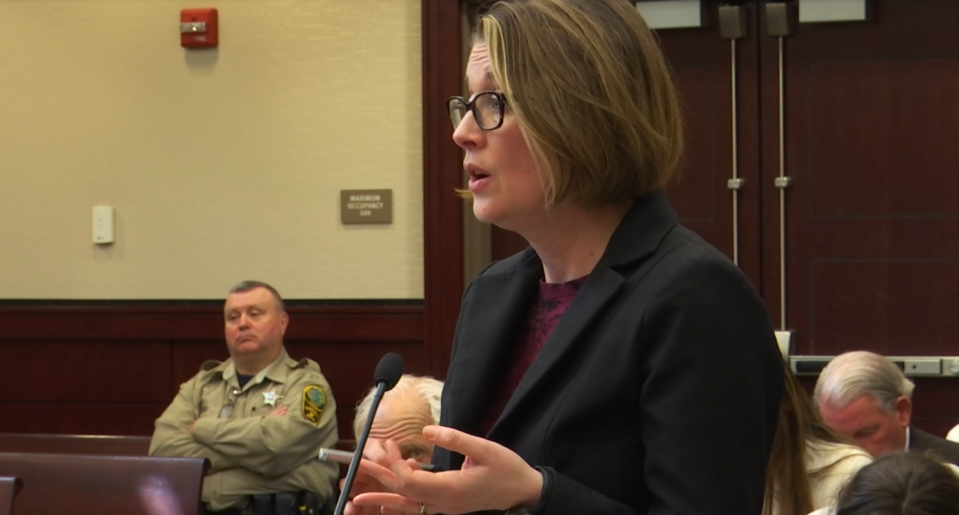Natural Bridge Zoo appeals, four-day circuit court trial scheduled
This story is part of our ongoing coverage of The Natural Bridge Zoo's legal problems starting with a Dec. 6, 2023 search warrant. To catch up from the beginning, click here.
LEXINGTON – The Natural Bridge Zoo animal seizure was appealed and is going to trial.
In January, a Rockbridge County General District Court judge agreed to return 39 of the 100 seized animals to the zoo following three days of arguments from Michelle Welch, the prosecuting attorney representing Rockbridge County and the office of the attorney general, and defense attorneys Mario Williams and Aaron Cook.
Both parties submitted appeals to the January ruling. The prosecution wants to keep the 39 animals returned to the zoo. The defense filed five motions, seeking to appeal the previous court decision, gain access to the animals for their experts, and suppress the evidence at the core of the case.
The result? A new-from-scratch, four-day jury trial is scheduled for Feb. 26 in the Rockbridge County Circuit Court.
Welch and Cook appeared before Rockbridge County Circuit Court Judge Christopher Russell on Wednesday. Cook was joined by attorney Erin Harrigan and confirmed to The News Leader that Williams was not on the appeal defense team.

The search warrant questioned
A search warrant was executed against the zoo on Dec. 6 and 7, the 100 animals seized over the course of these two days. The defense argued that the search warrant was not proper for several reasons.
First, the defense called the search warrant into question. The warrant was granted by a Powhatan County judge, rather than a Rockbridge County judge. The Rockbridge County sheriff’s office and courts were only notified a short time before the search warrant was executed. Harrigan argued the entire process should have gone through Rockbridge officials.
Welch defended the warrant process, saying Karl and Debbie Mogensen, owners of the Natural Bridge Zoo, "have ties to local law enforcement.” Welch felt the “more people who know, the more likely it is to get out." She also pointed out she was correct, “We were doing this so no-one was tipped off, but they were, and they moved the elephant to Florida” on Dec. 1.

Judge Russell found it “troubling” that Welch didn’t come to Rockbridge County and get a sealed search warrant instead of going through another county. Welch apologized for not doing so.
“There are all of these material omissions”
Second, Harrigan also attacked Sgt. Christine Boczar’s warrant application, pointing to reports that were made at around the same time as the application was written.
Several examples of potential contradictions between the report and the warrant application were raised, such as a capuchin cage. The capuchin was missing fur and seemed to not be well, the application said, but according to Harrigan’s account of Bozcar's report, there was also a sign on the cage explaining that the capuchin was being treated by a veterinarian for a medical condition. A picture of the sign was also found in the exhibits.
“There are all of these material omissions,” Harrigan told the judge, saying that evidence of “good care” was found in her notes but not in the application.
For the warrant, and all the evidence gained from it, to be thrown out, the defense would need proof testimony was not true. Welch argued a "critic's view of the affidavit” was not enough evidence of this to throw out the warrant. The prosecution felt the differences between the report and the warrant application were a matter for a jury to determine.
Did the informant work for the zoo or PETA?
Third, the defense wanted the confidential informant in the warrant unsealed, saying the informant works for People for the Ethical Treatment of Animals (PETA). Because of connection, the defense argued their opinions on the way animals were treated would be biased against the zoo.
Welch emphasized that the informant took video over their eight months working for the zoo, and the video was part of how the warrant was obtained.
The Dec. 6 and 7 evidence remains in play
Harrigan argued that someone facing penalties from the government should be able to challenge searches and seizures, especially when they are done under strange circumstances. Citing the Powhatan County-issued search warrant for a Rockbridge County property, the differences between Bozcar’s report and the application, and the informant with potential biased motives, the defense looked to have all the evidence seized during the search warrant execution to be suppressed.
Russell said that it “troubled” him that he could ethically agree with Harrigan’s argument about the ability to challenge the warrant, but he did not legally agree. After ample case law arguments, Judge Russell sided with the prosecution, keeping the search warrant, and the evidence that emerged from it, at the center of the prosecution’s case.

The state allowed to appeal
The defense argued against the prosecution’s appeal, saying the state cannot appeal a case using criminal procedure.
This case dances on the edge of the distinction between civil and criminal. Although civil forfeiture cases are civil cases, this changes when the assets being seized are living, breathing animals that could be in danger. Instead of the civil case process, which could go on for months, forfeiture cases with animals have ten business days before being heard by a judge. The higher turn around time changes the burden of proof from a civil case’s “preponderance of the evidence,” essentially that the state’s case is "more likely than not, and raises it to the "beyond a reasonable doubt" standard used in criminal cases.
The defense argued that the criminal standard only allowed a defendant to appeal. The state, however, argued that the procedure may be criminal, but the substance of the case was civil. She explained, “No criminal charges have been filed,” but also noted a criminal investigation was still ongoing. Because the case is civil, Welch argued, the prosecution had a right to appeal because it was a party to the case that did not win the entirety of their case.
“This is a close case,” Judge Russell said, “I think the case law supports the county’s position.”
The defense denied access to the animals
The defense moved for access to the animals, so their experts would be able to provide their own assessments.
Regardless to if this motion was granted or not, the animals have been with other caretakers for over two months. The experts would not be able to speak on the animals’ condition on the day of the search warrant, as their condition on that day is the basis of the state’s case.
Harrigan also alleged that the animal’s new caretakers would not allow the defense team access to them, per Welch’s request. Welch denied the allegation.
Judge Russell overruled the motion, denying the defense access to the animals.
The defense wins one motion
The defense did win one motion – they asked for a bill of particulars.
A bill of particulars is a detailed list of specific claims a prosecutor is making against a defendant. Cook asked for the list so he could avoid the “shotgun” defense used during the general court hearing, narrowing the scope of the trial to a specific set of claims about each animal during the jury trial.
Welch argued the list would be “unnecessary” because the defense has "all the discovery, they want us to walk them through the case.” Harrigan previously stated there were 300 gigabytes of digitized data and many more boxes of evidence the defense would have to review in person, making it difficult to know which expert for which animal the defense should call.
Judge Russell granted the motion, requiring the bill of particulars to be sent to the defense by Feb. 19 at noon.
Lyra Bordelon (she/her) is the public transparency and justice reporter at The News Leader. Do you have a story tip or feedback? It’s welcome through email to lbordelon@gannett.com. Subscribe to us at newsleader.com.
This article originally appeared on Staunton News Leader: Natural Bridge Zoo appeals, four-day circuit court trial scheduled

